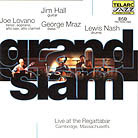October 2000
Grand Slam was recorded live at the Regattabar in Cambridge, Massachusetts using the DSD recording process that Telarc has been putting to such excellent use of late. I consider this disc one of today’s peak achievements in recorded jazz. In fact, there are so many things to like about this disc that to go into all of them would try your patience and be needlessly long-winded, so I will just highlight a few of the most salient features in order to whet your appetite. First, this is a demo-quality album in every sense of the word -- one that will both test your system as well as show it off when you’re demonstrating it to your audio buddies. (You do have audio buddies to impress, don’t you?) This disc gives you the sound of all four musicians in your listening room, playing solely for your musical enjoyment. While the soundstage is confined to the area between the speakers, there is plenty of air and space between and around the musicians, which conveys the sense of a real musical event. Lovano, whether playing alto clarinet or tenor, alto or soprano sax, has a biting edge to his sound, yet this is coupled with a smooth flow of air around and through his brass instruments. Mraz’s bass sound is full, deep and purrs nicely. There is a wonderful blending of plucked-string sound along with cavity resonance that is awfully close to the real thing. Nash’s drumkit is spread out -- perhaps just a tad too much -- allowing you to distinctly hear the physical placement of each drum he’s striking. Each cymbal stroke has the metallic shimmer that you generally only hear live. But it is Hall’s guitar that is best served here. It floats along, adding a splash of color here, a plucked note there, underpinning the music, laying a foundation for the others to play off of. And when each cut is finished, the applause sounds like flesh meeting flesh, and exists in a different acoustic space than the musicians This brings me to another high point of Grand Slam, the way each of the players on this disc hearkens back to other voices, other days. Hall, for instance, sounds much more like Bill Frisell here than the dreamy accompanist of Bill Evans, Paul Desmond or Sonny Rollins. Lovano has a more sparse, smooth, less boisterous sound than I’m used to hearing from him, reminding me more here of Sonny Rollins on his RCA recordings. Mraz, one of today’s great accompanists, here rids himself of his trademark virtuosity, bringing to mind the sound of Paul Chambers, for so many years the foundation of some of Miles Davis’ greatest groups. And Nash reminds me of such all-star drummers as Art Taylor, Roy Haynes and "Philly" Joe Jones. Kudos also to whoever programmed the tracks on Grand Slam, as he or she was wise enough to put the cut "Slam" first. This track, at over 12 minutes long, illustrates right from the start how well these four musicians play off of and with one another, as well as give each enough solo space to stretch out and express themselves. "Say Hello To Calypso," as calypso inevitably will, again brings Sonny Rollins to mind. And "All Across The City" shows the group at its lyrical and melodic best. The liner notes say that this is the debut of Grand Slam (the group). If that is an indication that we can expect more albums from this quartet, played at this level of musicianship and recorded as well as Grand Slam (the album), well, then, the line forms to the rear. Highly -- no, very highly -- recommended. GO BACK TO: |
 Jim Hall - Grand Slam
Jim Hall - Grand Slam![[Reviewed on CD]](../format/regcd.gif) The
term "grand slam" has transcended its baseball origins to come to mean a peak
achievement, the best possible result, the ultimate success. And just as a baseball grand
slam rewards its team with four runs for one swing of the bat, so Telarc's new CD Grand
Slam (which is the group’s name as well as the title of the album) gives the
listener four of today’s jazz giants together on one disc: Jim Hall on guitar, Joe
Lovano on saxes, George Mraz on bass, and last but certainly not least, Lewis Nash on
drums. These four have been playing together for a while now, mostly live dates in Europe,
allowing them to hone their sound before putting it on tape. (Kind of reminds one of the
good old days, when a group would play together first, record second.)
The
term "grand slam" has transcended its baseball origins to come to mean a peak
achievement, the best possible result, the ultimate success. And just as a baseball grand
slam rewards its team with four runs for one swing of the bat, so Telarc's new CD Grand
Slam (which is the group’s name as well as the title of the album) gives the
listener four of today’s jazz giants together on one disc: Jim Hall on guitar, Joe
Lovano on saxes, George Mraz on bass, and last but certainly not least, Lewis Nash on
drums. These four have been playing together for a while now, mostly live dates in Europe,
allowing them to hone their sound before putting it on tape. (Kind of reminds one of the
good old days, when a group would play together first, record second.)